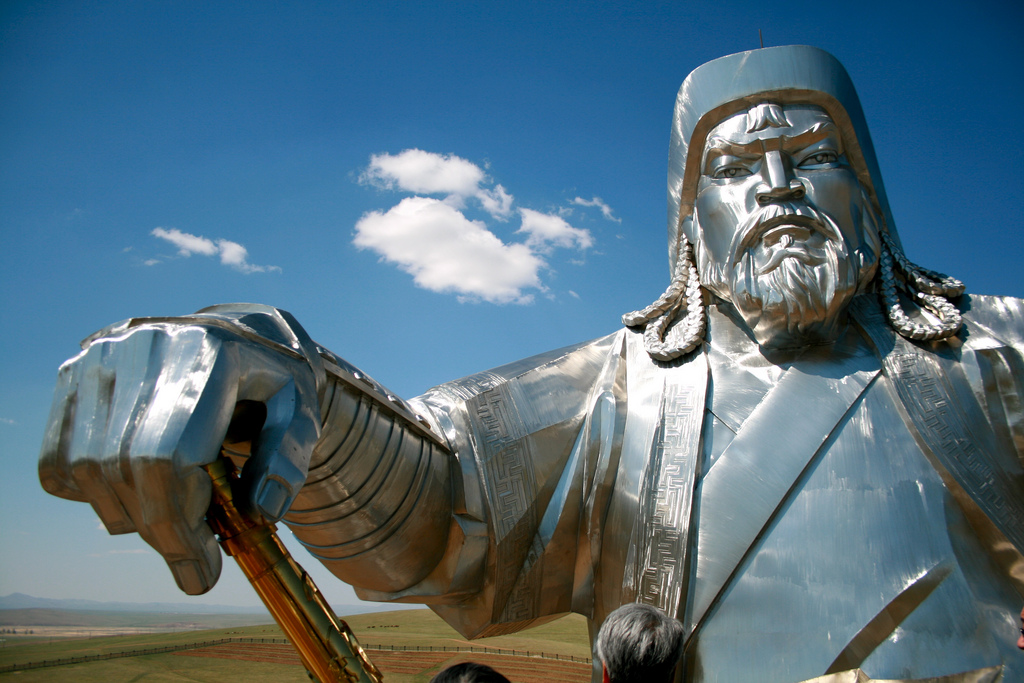So, he comes out of nowhere, and he and his heirs create the largest land empire in history.
It was not inevitable; horse nomads didn’t always win, they usually lost. At one point Temujin (his name, Genghis Khan is a title) chose not to attack the Chinese capital because he just didn’t have the forces.
Temujin was exceptional in many ways, and his life, especially his early life, reads like an adventure novel: He was exiled from his original tribe when his father died, killed his own older brother (ostensibly for hoarding food when the family was hungry), was captured by his enemies and escaped, rescued his kidnapped wife and refused to disavow the child she bore that may not have been his, and rather more. It’s worth reading.
Genghis Khan turned the Mongols into probably the most dominant military in history. They basically didn’t lose battles or wars during his life, and they weren’t defeated straight up until the Mamluks in Egypt, long after his death. The Mamluks did it by copying the Mongols, but it wouldn’t have worked against Temujin’s Mongols (I’ll explain why below).
The Nazis developed blitzkrieg, in part, by examining Mongol campaigns and strategy. The Mongols, in an era with no communication faster than a messenger, were able to coordinate multiple armies advancing hundreds of miles apart, so that they would meet at an agreed place on the same day. Temujin and his generals coordinated armies in a way contemporaries couldn’t. They were also startlingly fast: Mongol armies performed marches in the Russian winter which moved faster than WWII panzer armies over the same terrain.
The Mongols treated war and mass hunts the same: They couldn’t give a damn about glory or honor; they were there to defeat the enemy with the least losses possible, so they would regularly feint, withdraw before attacks while punishing them with bow fire, and so on. They gutted Eastern Europe’s chivalry just this way, and those who think that Europe could have stood up against the Mongols if they hadn’t withdrawn due the Great Khan’s death are simply fooling themselves. They defeated far more unified and dangerous opponents over as bad or worse terrain multiple times; the only terrain that ever stopped the Mongols was the Ocean (although it took them some time to conquer southern China due to terrain.)
Genghis Khan was ruthless. Because the Mongols were few in number, he would either recruit enemies into his ranks, or slaughter them outright. In cities that resisted, all men of fighting age would be rounded up, taken to the next city assault and forced to attack the walls. This is pitiless, to be sure, but the Mongols could not afford to leave populations capable and willing to rise up behind their lines.
When attacking a city, the Mongols generally offered quite generous terms–if the city didn’t resist. If it did, they would often destroy the city entirely. Part of this is because, especially at the beginning, they had almost no siege capability. Sieges took years the Mongols couldn’t afford, so they made surrender very tempting and the cost of resistance terrible.
Resistance in Afghanistan basically ended the Hellenic culture there. (But then, the Afghans killed Temujin’s emissaries when he asked for peaceful trade. Whoops.)
Khan was particularly good at espionage. He protected merchants, made friends with them, and used them as spies. When the Mongols invaded they would know their enemy’s weaknesses, including any vassals who were willing to rebel, any conquered and resentful minorities, and so on, and they used that information, often inspiring uprisings at the same time as their attacks.
All of this is very nice, and important, but the greatest aids to Temujin’s success were two things most people don’t concentrate on amidst all the slaughter, glory and rapine.
Genghis Khan was absolutely brilliant at sizing people up, and he was brilliant at inspiring loyalty.
Khan regularly took people who had been his enemies and made them his most important generals and administrators. None of them betrayed him.
One of the main causes of the Mongols’ later defeats is that after Khan and those who he had directly picked to administer and lead died, the genius was gone. The last truly great general, for example, was Subotai, who (as best I recall) never lost a battle (Subotai lead the attack on Europe).
Khan had genius subordinates, as competent as him or moreso at warfare and far better than him at administrating non-nomads. And they were loyal.
Khan certainly favored his family, but he didn’t do so to the extent of freezing out the truly talented. Competence and success were rewarded, in anyone, including, in notable occasions, in women. Relatedly, Khan, quite unusually for the time, enforced religious equality in his empire.
Once a population was conquered, they were taxed lightly, and the rule of law was enforced. One may quip the Mongols made a desert and called it peace, as with Augustus, but the Pax Mongolica was very real, and allowed travel from Europe all the way to China. The line is that, on Mongol patrolled routes, a virgin with a pot of gold was completely safe–including from the Mongols. You certainly couldn’t say the same virtually anywhere in Europe at the time (probably anywhere, but perhaps there were some small areas which were exceptions).
I bring all this up because Khan, of course, also killed millions and wiped entire cities from the map. The Mongols broke the flower of Muslim civilization, ending their Golden Age. (Anecdote: Upon conquering, I believe, Baghdad, the Mongols, who had a taboo on spilling royal blood, locked the Caliph in his treasury with his gold to starve, commenting that he should have spent it on armies and defenses. They were not without a rough sense of humor.)
The historians I have read on the period often note that Mongol atrocities weren’t worse than most of the people they fought. Instead, the Mongols were just far more successful (but that doesn’t change the sheer scale of them).
So, why do I bring all this up?
Because Genghis Khan is far removed from our time. We have very few real emotional feelings about him (unless you’re Mongol, and some Chinese are still angry).
Genghis Khan was a great man. I don’t think there’s any reasonable definition of great that doesn’t conflate great with good, a criteria which he does not meet. He was extraordinarily competent, one of the most competent figures we know of in history. He was honorable, keeping his deals. He loved his wife greatly, there is no question of it; the romance and love of Borte and Temujin is one of the great historical romances. He was religiously tolerant in an age of violent religious bigotry.
He also killed millions. Effectively destroyed civilizations. He was evil by any useful definition of evil. He was a great man, an evil man, an honorable man, a man who inspired great dedication and loyalty. He committed fratricide, something his own mother never forgave him for.
Bad man. Competent man. Honorable man. Great leader. Great general (though not the best Mongol general; note that Genghis Khan could secure the loyalty of men who were more competent than him).
I’m going to return to this theme at least one more time. In the meantime, Genghis Khan, great man, world’s greatest conqueror (you can quibble about Alexander, but I give it to Temujin), evil, genocidal bastard. Romantic.
All at the same time.
In the meantime, reading up on the Mongols and Khan is fascinating, can teach you a great deal due to distance, and can be disturbing as well.
If you enjoyed this article, and want me to write more, please DONATE or SUBSCRIBE.




![Image by [rom]](https://www.ianwelsh.net/wp-content/uploads/2009/03/japanese-fan-by-rom-199x300.jpg)
 Identity is not nonsense.
Identity is not nonsense.